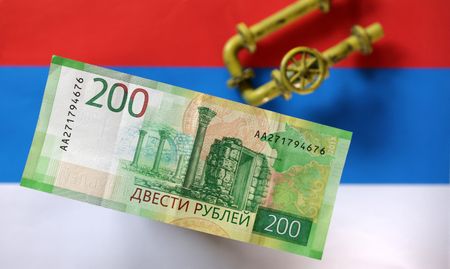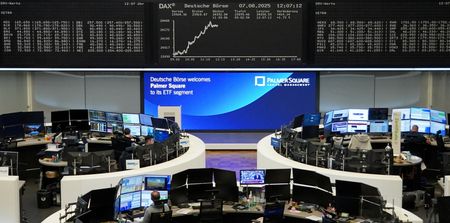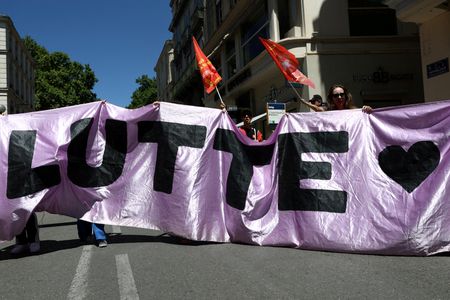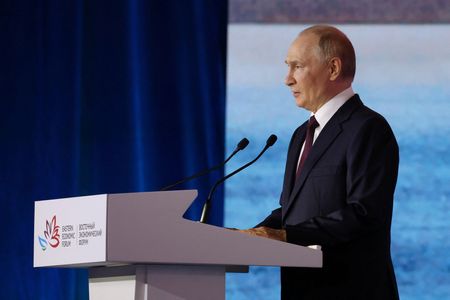By Darya Korsunskaya and Gleb Bryanski
MOSCOW (Reuters) – A strong rouble and low oil prices are set to widen Russia’s budget deficit this year, adding to the pressure on it from military spending and forcing the government to borrow more than it planned or tap its remaining fiscal reserves, analysts say.
The rouble is up 26% against the dollar so far this year as relations with the U.S. thaw out and the potential for an end to the conflict in Ukraine grows. But the currency is also 12% stronger than the level assumed in this year’s budget.
“A strong rouble is a blessing for the people but a pain for the budget. This is because we receive oil and gas revenues in foreign currency, which are then converted into roubles,” said economist Evgeny Kogan.
If the currency stays near 81 per dollar all year, Kogan said the deficit would expand to 1.5 trillion roubles – more than the currently planned 1.2 trillion.
While the cabinet had aimed to narrow the budget gap to 0.5% of gross domestic product this year, the early signs are not good: In the first two months of the year, the deficit ballooned to 1.3%.
Furthermore, while recent U.S.-Russia talks and telephone conversations between the two nations’ presidents have raised hopes for peace they have not yet led to a ceasefire.
“Since the geopolitical context remains extremely volatile, the Ministry of Finance’s plans may undergo adjustments,” said Alfa Bank’s chief economist Natalya Orlova, adding that growing spending was an inflationary risk.
ROUBLE DECOUPLES FROM OIL
Meanwhile, the international price of Russia’s Urals blend of oil fell to a 14-month low of around $54 per barrel by mid-March, pushing the rouble price used for Moscow’s fiscal calculations to its lowest since June 2023 – a hefty 29% below the 2025 budget benchmark.
A lower oil price usually triggers rouble weakening, and some economists called the current “decoupling” of the exchange rate from the oil price a unique situation for the Russian economy.
TsentroKreditBank economist Evgeny Suvorov believes budget cuts become inevitable if the oil price sinks to $50 per barrel or less.
“How to do this during ongoing military action is unclear,” he said.
In the first two months of the year revenues from energy sales, which account for about a third of Russia’s budget income, fell 3.7% year-on-year to 1.56 trillion roubles, according to the Finance Ministry.
“The situation is not Armageddon but it is nevertheless sensitive. These are significant losses that will need to be covered either by additional borrowing or by using the National Wellbeing Fund,” said Sofya Donets from T-Bank.
Donets estimated the potential budget losses at 1-2 trillion roubles this year.
Russia’s rainy day National Wellbeing Fund (NWF) has become the main source of financing for its now persistent budget deficits. The fund’s liquid assets have dropped by about two-thirds to just $37.5 billion during the war.
The Finance Ministry has warned of risks to oil and gas revenues due to weakening prices and acknowledged that the deficit may exceed planned targets.
Still, the government does have a safety cushion thanks to its low debt overall and its remaining fiscal reserves.
LOW DEBT
Russia’s has one of the lowest public debts in the world at 14.5% of GDP, albeit up by 13.5% from 2023, giving the government room to borrow more.
The government has taken advantage of a falling geopolitical premium on its bonds this year, raising 1.4 trillion roubles, more than the entire planned deficit, from fixed coupon bonds, with yields reaching a 10-month low of just under 15%.
The government has stopped placing bonds with a floating coupon, linked to the central bank’s key interest rate, now at 21% – the highest level since the early 2000s, suggesting it is confident it can raise funds at fixed rates instead.
The central bank noted renewed purchases by foreign investors last month, with Raiffeisen Bank calculations showing that in February they bought state bonds worth 43 billion roubles, three times the amount they bought for the whole of last year.
Finance Minister Anton Siluanov said on March 26 that the rouble rate will correct as demand for imported goods and therefore foreign currency rises. He dismissed the idea that the exchange rate would affect the budget.
“The budget does not depend on various exchange rate ratios because the most important thing is that everything we have planned will be funded, regardless of the exchange rate ratios that develop,” Siluanov said.
(Additional reporting by Elena Fabrichnaya and Maxim Nazarov; Editing by Hugh Lawson)










